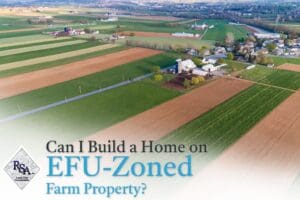 Are you considering building a home on EFU-zoned farm property in Jackson County, Oregon? If so, it’s essential to understand the specific land use laws and zoning restrictions that may apply. While the idea of living on your farmland may sound simple, Oregon has some of the nation’s most rigorous land use protections—especially when it comes to preserving agricultural land.
Are you considering building a home on EFU-zoned farm property in Jackson County, Oregon? If so, it’s essential to understand the specific land use laws and zoning restrictions that may apply. While the idea of living on your farmland may sound simple, Oregon has some of the nation’s most rigorous land use protections—especially when it comes to preserving agricultural land.
At Richard Stevens & Associates, we specialize in helping landowners and developers navigate the rules, applications, and strategies required to make responsible land use decisions. While every situation requires individual analysis, here’s a broad overview to help you understand if you can build a home on EFU-zoned farm property in Southern Oregon.
What Does EFU-Zoning Mean?
EFU stands for Exclusive Farm Use, a zoning designation created to protect and preserve Oregon’s agricultural land for farming and forest practices. If your land is zoned EFU in Jackson County, that means your ability to build a residential structure is highly regulated by both Oregon Revised Statutes (ORS 215.283) and the Jackson County Land Development Ordinance (LDO).
The primary goal of EFU zoning is to support farm operations and prevent development that would disrupt or displace agricultural use. Because of this, not all homes are allowed, even on large or privately owned rural parcels.
What Homes Are Allowed on EFU-Zoned Farm Property?
Building a home on EFU land is not impossible—but it must fall into one of a few clearly defined categories.
1. Primary Farm Dwellings
If your property is actively used for farming and meets Oregon’s minimum income from farm operations requirements, you may be eligible to build a primary farm dwelling. The required income depends on the size of your parcel, and you’ll need to provide supporting documentation such as tax returns or sales receipts.
2. Accessory Farm Dwellings
A second dwelling may be allowed to support your farming operation, such as housing for a full-time farm employee or a relative actively involved in farming. These dwellings are limited in scope and also require deed restrictions.
3. Replacement Dwellings
If your EFU-zoned farm property already has a legally established home—even if it’s no longer habitable—you may qualify to replace it, provided you follow Jackson County’s replacement criteria.
4. Temporary Medical Hardship Dwellings
In some situations, a temporary manufactured home may be approved to care for a family member with a medical hardship. This use is closely monitored and must be removed once the hardship ends.
Are Non-Farm Dwellings Ever Allowed?
If your goal is to build a home on EFU-zoned farm property without operating a farm, the path forward is more complex. Non-farm dwellings are not permitted outright and require a conditional use permit.
To gain approval, you must:
- Prove that your home will not interfere with surrounding farm or forest uses.
- Show that the proposed location is not on high-value farmland, or that no better alternatives for your dwelling exist.
- Demonstrate that your development will not cause significant adverse impacts to agricultural practices.
Even then, approval is not guaranteed. The county carefully reviews these proposals using criteria from ORS 215.296, and each case is highly site-specific.
What Is a Lot-of-Record Dwelling?
In some cases, landowners with long-held parcels may explore the option of building under lot-of-record provisions. This applies to parcels created before land use laws, though the parcel still must meet various zoning, soils, and land-use criteria.
This path may allow for a non-farm dwelling, but it typically requires:
- A soil capability assessment
- An impact analysis
- A full land use application and review process
Without expert help, this process can be difficult to navigate.
Don’t Forget About Taxes and Rollback Penalties
Owning EFU-zoned farm property often provides the benefit of a special farm-use tax assessment, lowering your property taxes as long as the land is actively used for farming. However, if your land stops qualifying or is removed from farm use, rollback taxes can be assessed for the prior five years—adding a financial penalty you may not expect.
Why You Should Consult with Richard Stevens & Associates
Land use regulations in Oregon are complex—especially when it comes to building homes on EFU-zoned farm property. Attempting to interpret these rules yourself can result in denied applications, costly delays, and missed opportunities.
That’s why property owners turn to Richard Stevens & Associates. We help you:
- Understand your zoning and legal options
- Prepare and submit complete land use applications
- Interpret county and state laws
- Conduct soil, impact, and land capability studies
Whether you’re planning to invest in EFU-zoned land or already own property you’d like to develop, we’ll guide you through every step of the process.
Building a home on EFU-zoned farm property is possible—but only if you meet the specific requirements outlined by law. Don’t leave it to chance!
Contact Richard Stevens & Associates today for a consultation before investing or applying to build. We’ll help you understand your land’s potential and avoid costly mistakes.
